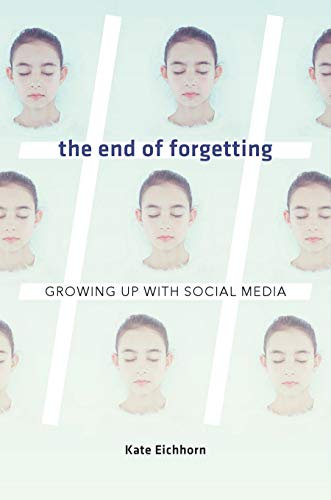I recently read Kate Eichhorn’s book The End of Forgetting: Growing Up with Social Media. In fact, I picked it up while I was at the 4S conference in New Orleans. It seemed to offer the best of science studies, namely careful analytical work around important issues in science and technology. Good stuff.
I’m curious about the effects of social media on childhood. I’ve seen plenty of evidence social media changes – and perhaps distorts – childhood. What kind of evidence? Young people carefully curating their social media profiles, grandstanding or engaging in other attention-seeking behavior online, using temporary and/or anonymous chat apps, and propagating oddly insular and distorted views about most Americans.
The End of Forgetting appealed to me for another reason. I’m 36 years old. Born in 1983, graduated high school in 2001, and graduated college in 2005. I grew up in a rural area, and we didn’t have high speed Internet until almost all the rest of the US already had it. That’s a long way of saying I’m one of the final Americans to have a childhood completely free of social media and almost totally free of the Internet. I also don’t have children. This means I have no direct experience of growing up with social media. None.
I don’t know much about Kate Einhhorn, but I don’t think she grew up with social media, either. Maybe she had the same curiosity.
The End of Forgetting
Here’s Eichhorn’s view. Prior to the digital age, we had more freedom to shed our past. Maybe we did something dumb or embarrassing 20 years ago. Back then, we could do something about it. What was that? One, we could change who we interacted with. But, two, the media we had available were things we could delete or destroy. We can collect and destroy physical photos. And VHS tapes, too, if they even still work on our current media players.
The digital age isn’t like that. Childhood perpetually haunts us because we can’t erase it and start over. And not only that, but we can’t really move beyond it at all. Even when there’s nothing especially bad about it. We can’t grow through previously normal life stages because of the consistent narrative the digital age provides for us.
Eichhorn asserts that forgetting is a normal part of growing up, and it’s a part young people have now lost. Consequently, they can’t grow up. And I think Eichhorn has some good reasons to assert these things.
The End of Growing Up
The End of Forgetting provides us with a thesis that’s ultimately about a new state of arrested development. Our past haunts us in ways it simply couldn’t before the late 1990s or early 2000s. One, parents ubiquitously share images and videos of their children from the moment of birth. Granted, that’s not totally unique. It happened with camcorders and VHS. But in 2020, it’s almost impossible to opt out of this system in any way and at any stage of life. That which is on Facebook will perpetually exist in digital form. This limits our ability to do lots of things, from preventing bullying to changing our identities to growing into better versions of ourselves.
Two, social media limits our choices about how much of our lives to take with us as we become adults. 30 years ago – and even more so 50 years ago – we had far more control over who contacted us. We could decide to list our number in the phone book or not to list it. We could answer it, not answer it, or take it off the hook. And we could pack up our bags and leave town, leaving people behind we didn’t want to see. Social media makes all these things more difficult. And marginalized groups, particularly LGBTQ youth, feel the most negative effects.
The Nature of Perpetual Childhood
So, while I was reading The End of Forgetting, I thought about the nature of perpetual childhood. If that’s the state of today’s youth, what does it look like? What does its future look like? How does it impact our cultural forms, educational systems, political organization, economic resources, et al.? Does it bear any relationship, with, say new ways of organizing relationships or new ways of working?
Answering these questions would also help us evaluate the book’s core thesis. I think ‘the end of forgetting’ is a very compelling way to look at social media’s impact. But while constraining our growth and identity formation in some ways, social media opens these things up in others. It tethers us to the past while helping us find people more like ourselves. And, consequently, it’s possible the latter outweighs the former. If so, maybe social media opens up new – albeit different, and sometimes for the worse – ways to grow up.
